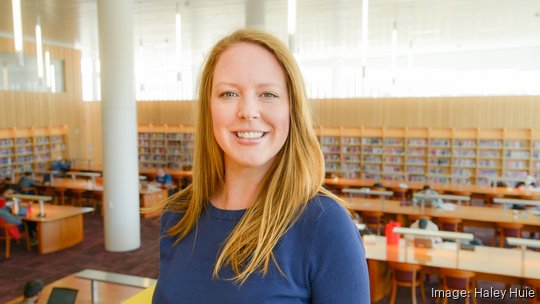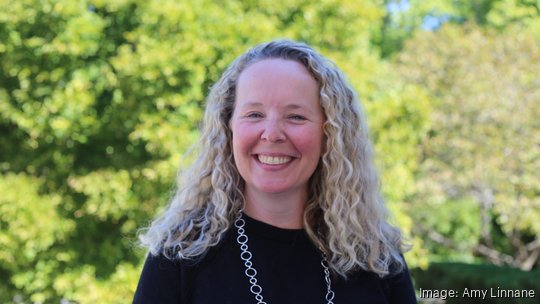
Two women who took winding paths to entrepreneurship are now leading the charge for startup creation at two of the Triangle's largest universities.
Haley Huie is the director of the North Carolina State University Entrepreneurship Clinic. Amy Linnane is the managing director of programs at Duke Innovation & Entrepreneurship. Both are obsessed with university innovation and see it as a way to not only create jobs in North Carolina, but to change the world.
Both women have similar advice to startups looking to push through the tough funding environment of 2023: Don’t raise capital unless you have to.

Through candid conversations, the women spoke to Triangle Inno about how they rose to lead some of the region's most prestigious entrepreneurship programs – and what they’re telling the entrepreneurs they’re advising today.
Haley Huie
At N.C. State, Huie likes to tell people she has “the best job on campus.” For the past year she’s led the entrepreneurship clinic. But the Kannapolis native wasn’t always obsessed with startups.
After school at N.C. State, she was a journalist in Virginia, “which was a really great way to learn how the world works.” But the newspaper world was shrinking.
When her friends moved to San Francisco, she took a chance and followed along. She found out she was “really ready for a big adventure.” That’s what she discovered in California, watching friends creating companies and going through accelerators, and she wanted to be part of the action. She ended up consulting with startups.
“Quite simply, the bug bit me there,” Huie said. “I saw all this incredible startup activity. … I even saw folks I knew from university when I was at N.C. State, doing such exciting things … you become a sponge.”
She built a life and met her husband. But the region she’d left behind in the Triangle was growing too.
“We actually realized it when we came home to Raleigh for my little brother’s graduation at N.C. State,” Huie said. She recalls sitting outside on Fayetteville Street and taking stock of Raleigh’s livability. “We just thought, wow, we could totally take these lives we built and come here.”
So in 2015 she moved to Raleigh, and hasn’t looked back. She’s had a few roles at N.C. State, such as helping to relocate and build up the Entrepreneurship Garage. She landed at the entrepreneurship clinic just over a year ago, where she also helps run the Andrews Launch Accelerator. She said the spirit of entrepreneurship is something N.C. State intentionally fosters, from the chancellor to the faculty. “Everyone is so excited to see how they might expose students to entrepreneurship.”
Huie sees what’s being built at the clinic as bigger than N.C. State.
“This can be an engine for economic output, let’s go ahead and plant seeds,” she said.
Amy Linnane
At Duke, Connecticut native Linnane has been in her current role since 2019. Like Huie, she didn’t initially envision life as an entrepreneur.
Linnane taught elementary school before staying home with her kids and getting antsy.
“I could only be a PTA volunteer so many times,” she said. Her husband, Michael, had an idea for a business, that people “are going to sell on more than just Amazon.”
That business became Chapel Hill’s FeedStation. It was a part of UNC-Chapel Hill’s entrepreneurship initiative, LaUNCh Chapel Hill. Along with the other companies in the program, it inspired Linnane to find her own niche. She worked with Launch Chapel Hill leader Dina Rousset to create an entrepreneurship curriculum, flexing her education muscles.
Linnane took over the leadership spot when Rousset left the organization. “My encouraging attitude and strong mom energy was a good fit for running an accelerator,” she said.
Flash forward a few years later, and Duke offered a place to do something similar, but work more closely with colleagues.
Linnane said starting at Duke just before the pandemic was an advantage, as through quarantine entrepreneurship challenges emerged that helped her make the case for why innovation was important and worthy of university investment.
“It was how can we make zoom more accessible to people with disabilities, how can I make online learning more fun. … We were working with students who were interested in solving new problems, who were in different verticals,” she said.
What they’re telling entrepreneurs
Huie is telling students to focus on building their own revenue streams before hitting the pitching road show.
“You always want to keep eyes on your long-term vision, but really the path right now is to insanely focus on your customers, build your revenue,” she said. Focusing on growing your own revenue “is going to be your lifeline,” she said.
“The goal has really become, prove it in the market place,” she said. “Really intensely focus on your validation work. Build the best product. Grow your own revenue.”
And the investment opportunities can follow, she said.
At Duke, Linnane said her bias has always been to encourage students to avoid raising money unless they have to.
“If you’re in this as someone who wants to be their own boss … a venture capitalist is giving you money and an opinion you have to listen to,” said Linnane, who also runs the Innovate Duke Program and the school’s Summer Accelerator. “So the longer you can bootstrap the better.”
Linnane points students to alternatives such as NC IDEA Foundation, which offers micro-grants to fund early ideas. Even a grant worth just a few thousand dollars is “so validating and can really move the needle,” she said.
“My advice is always to be as lean as you can, keep as much as you can,” she said. “There are great ways to create very low cost prototypes for most things. … Think about what opportunities are out there aside from raising capital.”